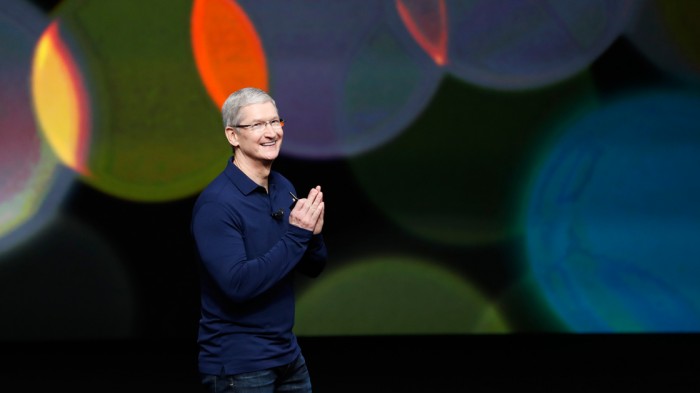Why Apple Can’t Match the iPhone’s Success
“The iPhone has transformed how we do things every day,” Apple CEO Tim Cook said in San Francisco on Wednesday, introducing the iPhone 7, the latest in a product line that created the smartphone industry when it debuted in 2007.
The iPhone has also transformed Apple, turning it into the most valuable corporation in the world. The company has sold over a billion of the devices. But the iPhone's effects are beginning to wear off. Making another product that creates such a large new market, so fast, might be impossible. “Usually you don’t see companies start more than one industry," says Constance Helfat, a professor who studies tech-company strategy at Dartmouth College.
In nine years the iPhone has delivered over $600 billion in revenue and $250 billion in profit. It contributes the majority of Apple's revenue each quarter. But iPhone sales fell 15 percent in the most recent quarter, continuing a slump that began earlier this year and has cut profits. An estimated two billion people now own smartphones. New models like the iPhone 7, and even features like Apple's new wireless headphones, amount to incremental upgrades.

The iPhone fit a pattern seen in other products that have opened up new industries, like Ford’s Model T. Apple took an idea others had been working on—pocket computers—and created the first version polished and priced correctly for mass-market adoption.
But although the iPhone is often hailed as a major technical breakthrough, Apple in fact discovered its vast new opportunity without straying far from its existing products and expertise. In contrast, finding another iPhone-scale opportunity would likely require Apple to look further afield from what it already does. After all, smartphones have succeeded because they take over functions from other gadgets and computing devices. That would make it hard for a new independent computing device—such as Apple’s watch—to gain anything close to the same universal appeal.
Benedict Evans, a partner at venture capitalist firm Andreessen Horowitz, argues that automobiles are “the obvious next market” for a hardware company like Apple to look to for smartphone-scale opportunities. Facebook founder Mark Zuckerberg has said virtual reality will be the next major computing platform, but Evans says it looks far from certain to reach a truly mass market.
Apple has hired engineers with experience building cars, including from electric automaker Tesla. But succeeding in a market so far removed from what Apple has done before would be altogether different from what it did with the iPhone. In addition to the technical challenge of building up new design and manufacturing operations, Apple’s success would likely depend on working more closely with other companies than it did with the iPhone. An Apple car would also have to compete more directly with existing products and companies than the iPhone did when it appeared.
Although iPhone sales are down, Apple will continue to sell plenty of them as people upgrade. The company remains highly profitable and has more than $200 billion in cash on its books. And Apple very well could fill the gap left by slowing iPhone sales even without products that blast open new markets. The company has ample opportunities to create new revenue streams by building on the platform of products it already has, says Marvin Lieberman, a management professor at the University of California, Los Angeles.
Indeed, at Wednesday's event, Cook highlighted the growth of the Apple Music streaming service that launched last year and now has 17 million paying subscribers. Cook has boasted to investors that revenue from services such as Apple Music and the Apple Pay contactless payments system is growing fast.
Apple has also bought at least four artificial-intelligence companies in the past year, which could help its efforts to make its automated assistant Siri more useful. An update to Apple's mobile operating system due soon will allow Siri to control third-party services, so you can do things like order a ride with Uber just by talking to your phone. But it's unclear how features like that can earn money for Apple. And even if such assistance services become big business, the market doesn't figure to be much like the open field Apple had with the first iPhones. Rivals such as Google and Amazon have already been investing heavily in AI projects and virtual assistants of their own.
This story was updated on September 8.
Keep Reading
Most Popular
Large language models can do jaw-dropping things. But nobody knows exactly why.
And that's a problem. Figuring it out is one of the biggest scientific puzzles of our time and a crucial step towards controlling more powerful future models.
How scientists traced a mysterious covid case back to six toilets
When wastewater surveillance turns into a hunt for a single infected individual, the ethics get tricky.
The problem with plug-in hybrids? Their drivers.
Plug-in hybrids are often sold as a transition to EVs, but new data from Europe shows we’re still underestimating the emissions they produce.
Stay connected
Get the latest updates from
MIT Technology Review
Discover special offers, top stories, upcoming events, and more.